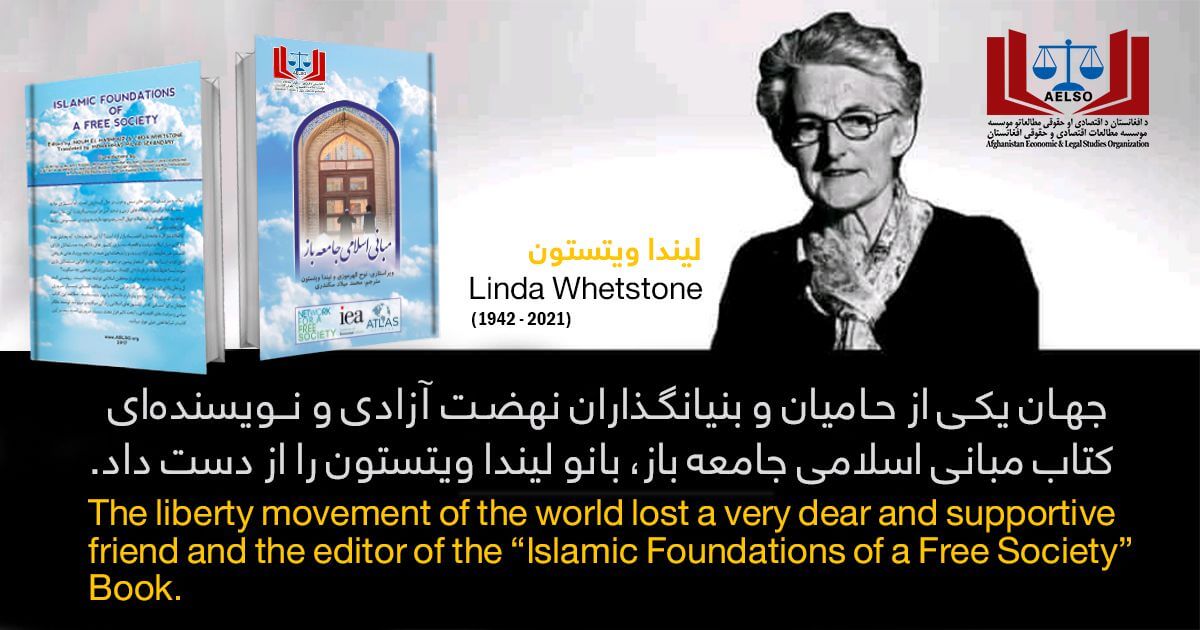
National Tolerance Conference-2022
Six months after the collapse of republic; The first National Tolerance Conference in Afghanistan
10 March, 2022 | Bakhtar University, Kabul
The National Tolerance Conference organized by the Afghanistan Economic & Legal Studies Organization(AELSO) in cooperation with Bakhtar University, The White Assembly and other prestigious organizations on the values of pluralism, tolerance, liberty and entrepreneurship as well as the compatibility of these values with the teachings of the holy religion of Islam and participation of 200 (Male & Female) writers and youths as representatives of their respective provinces from all over the country, in Kabul city.
In this difficult and challenging situation of Afghanistan where the motivation of youths to learn knowledge has dropped to the lowest level and life expectancy among people has decreased but in the meantime, responsible think tanks such AELSO takes initiatives to re-motivate youths. Six months after the collapse of republic, in a state of transition and midst of despair across the country, Afghanistan Economic & Legal Studies Organization(AELSO) by organizing the National Tolerance Conference shifted the hope for change and tolerance to a positive side and took the first fundamental step towards forming dialogue and discourse of tolerance for economic growth and empathy among the country’s tribes at the national level.
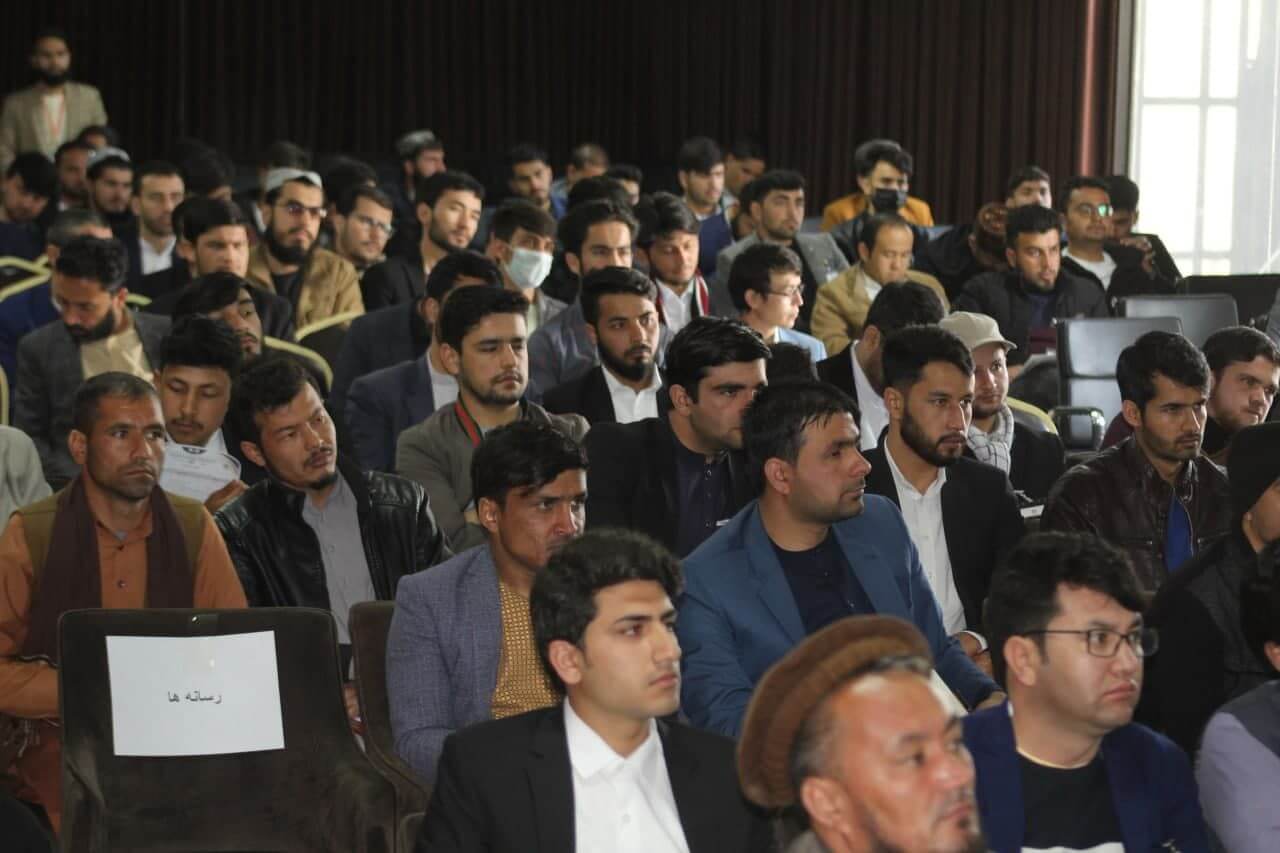
At the National Tolerance Conference, well-known Afghan scholars and youths from 34 provinces of the country shared their views on promoting tolerance, fighting against poverty, liberty, entrepreneurship, economic growth and pluralism.
Participants of the National Tolerance Conference, considered tolerance to achieve social peace and conflict resolution, pluralism to achieve political and social stability and economic independence to achieve freedom of individuals and economic, as the serious necessity of Afghanistan’s current situation and emphasized on taking practical steps for implementing these values by government, universities, think tanks, political parties and other civil society organizations.
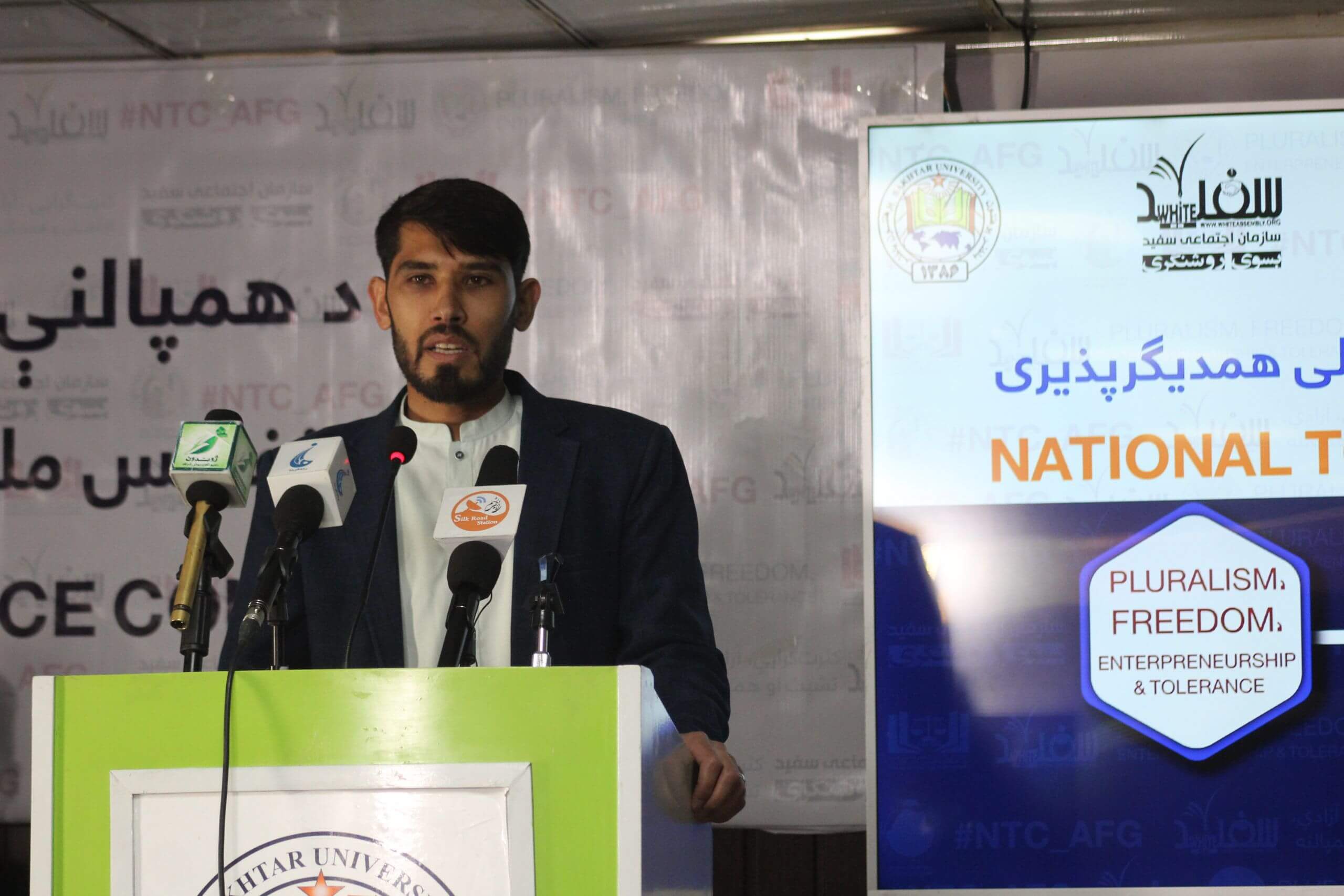
Mr. Beheshti, the head of research department of AELSO, spoke on behalf of this think tank at National Tolerance Conference and stressed: ” Main topics of this conference are tolerance, liberty and entrepreneurship and all the participants as representatives are responsible to implement the learned lessons from this conference to their own respective provinces.”
Mr. Beheshti added: ” The pride of Afghanistan Economic & Legal Studies Organization(AELSO) is the pride of entire nation of Afghanistan. AELSO had lots of efforts to promote values of tolerance, liberty and prosperity in last two decades in the country and also achieved many international awards and appreciations by conducting numerous different programs, seminars and conferences.”
Speaking about the role of pluralism in overcoming conflicts and resolving social and political challenges, AELSO’s head of research department said: ” Pluralism is the base of Islamic society because in holy religion of Islam no nation or group is superior to another and sovereignty is the basic right of the country’s citizens. Pluralism causes social and political stability and provides the basis for acceptance of different ideas and thoughts in accordance with the teachings of the holy religion of Islam.”
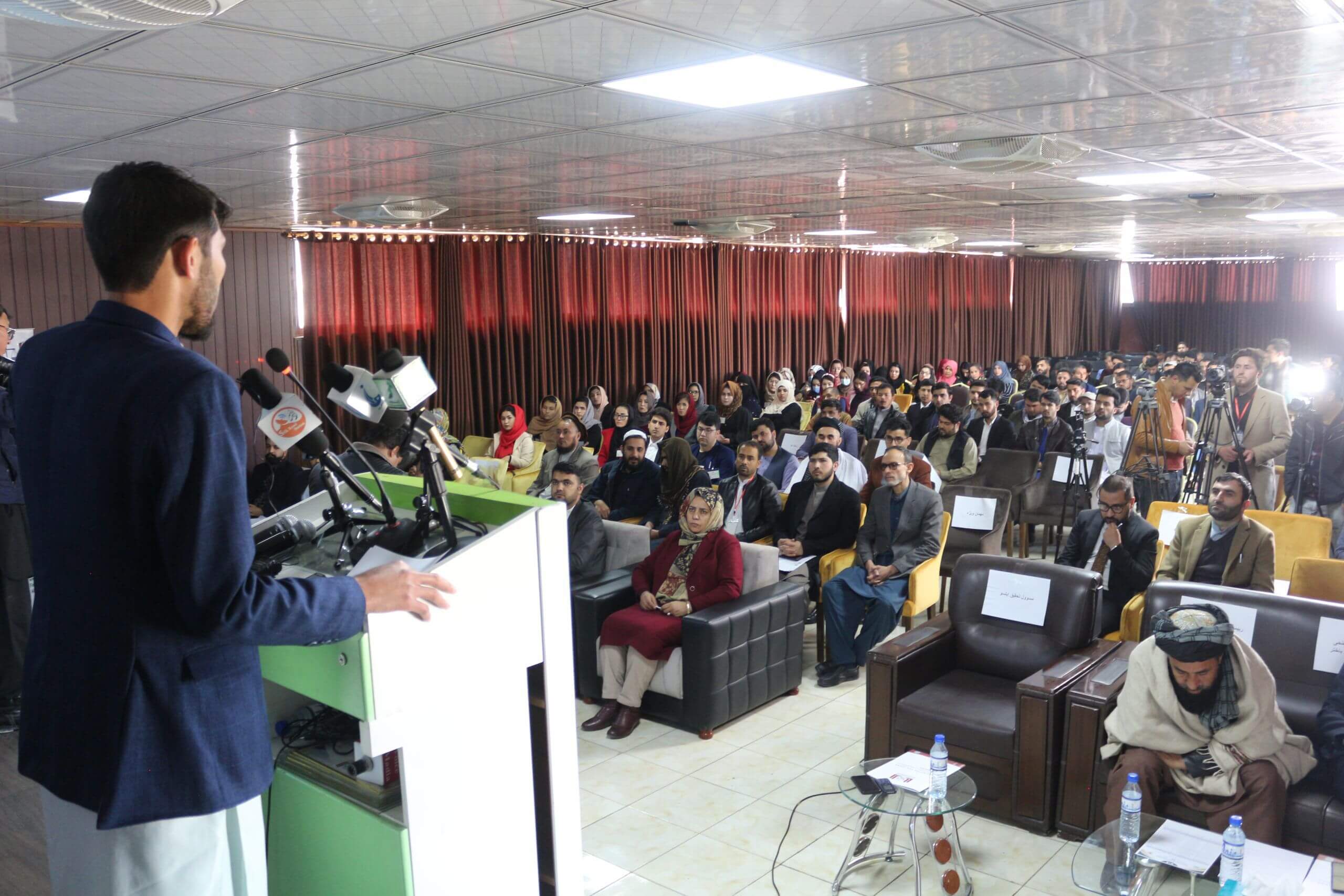
Beheshti spoke about the role of entrepreneurship in prosperity and economic freedom of the country and said: ” Political and economic freedom of a country depends on economic independence of that country. Entrepreneurship as base of economic growth and prosperity of a country has been one of the strategic goals of our organization so far. For achieving this goal, translating the ” An Introduction to Entrepreneurship” by Moh. Khaild Ramizy, CEO of Afghanistan Economic & Legal Studies Organization(AELSO), preparing the audio version of this book and translating it into Pashto language was one of the most important activities done by this think tank to bring prosperity in Afghanistan and give the youths the ideas to how they can start their own businesses and fight against poverty.”
To overcome the challenges and reach a prosperous and mutually acceptable Afghanistan, the head of research department at Afghanistan Economic & Legal Studies Organization(AELSO), presented two basic messages:
“Our message from the address of elites, thinkers, writers, citizens of Afghanistan and especially youths of the country to responsible government is to take the full advantage of these opportunities for institutionalizing the culture of mutual acceptance and political pluralism and bringing lasting freedom, prosperity and development to the country. Also, ensure the presence of all social and political groups in the national sovereignty of Afghanistan.”
The message for youths and participants of this conference is: “Afghanistan Economic & Legal Studies Organization (AELSO) always welcomes your solutions, suggestions and ideas. Youths should prevent from aimless and illogical criticism and prepare their plans and strategies in the direction of co-existence, pluralism and economic growth of the country in a codified form. AELSO will be by your side for implementing your projects in every provinces of the country and will share its experiences with you.”
Mr. Beheshti also reminded the activities of AELSO and added: ” We continue our activities by referring and based the “Islamic Foundations of a Free Society ” book which has edited by Linda Whetstone and a group of Islamic scholars as a source for our work and now this book is the basic source for the activities of many organizations’ in Afghanistan which enabled them to continue their activities.
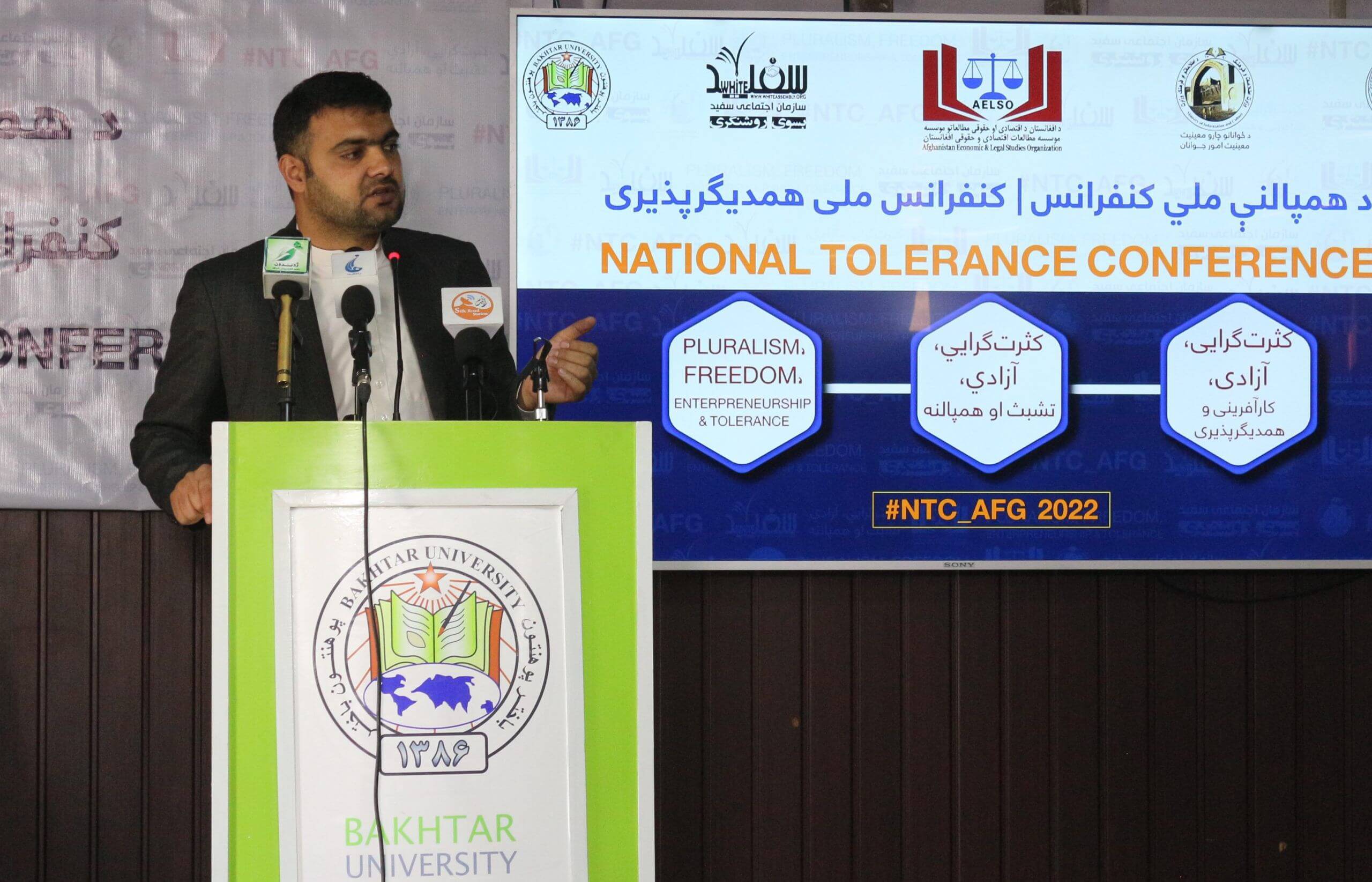
Following the conference, Hazratullah Sharifi, head of programs coordination at Deputy Ministry for Youth Affairs, spoke on behalf of Deputy Ministry for Youth Affairs of the Ministry of Information and Culture and said: “Conducting such programs and conferences are very useful for bringing together youths and uniting their ideas. On be half of the Deputy Ministry for Youth Affairs, I heartily thank and appreciate the valuable initiative of the Afghanistan Economic & Legal Studies Organization(AELSO) and Bakhtar University for organizing National Tolerance Conference.”
He also emphasized: ” Mutual acceptance, co-existence and tolerance has important role in Islamic law. Our religion always called us to accept each other, to bring co-existence and to have brotherhood in different verses of the Holy Quran.”
Mr. Sharifi announced the plans and strategies of Deputy Ministry for Youth Affairs in 2022 and listed them as below:
- Conducting an enormous conference about tolerance and mutual acceptance with the participation of 150 youths from across the country
- Establishing the Youth Parliament
- Establishing provincial councils and the High Youth Council.
- Organizing culture trips between provinces
- Conducting various seminars and programs to increase the capacity of youths
- Organizing poetry programs among youths
- Establishing a discourse about the role of civil society and youths with the current government leadership
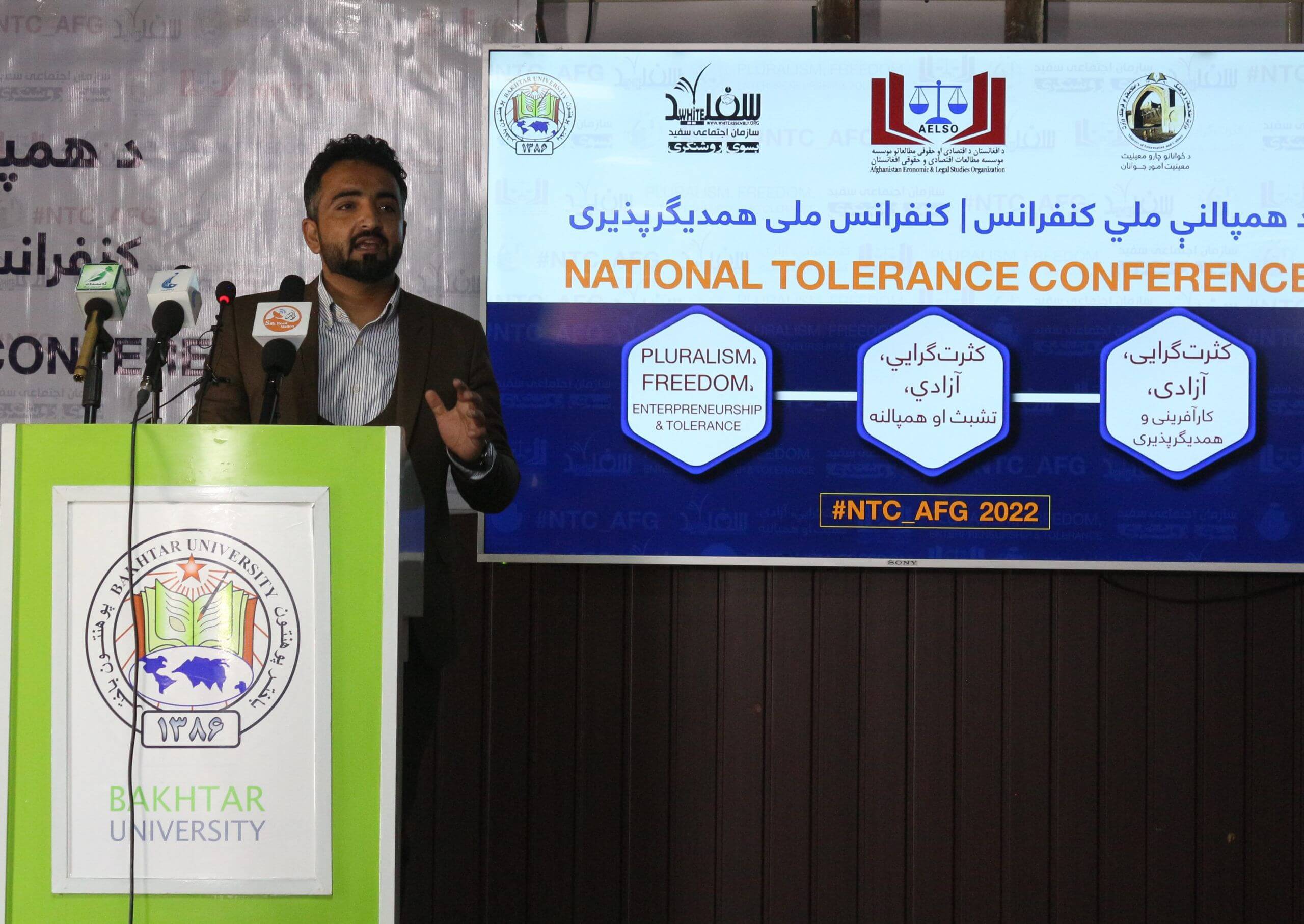
Continuing the conference, Baher Zaland, vice Chancellor of Bakhtar university, spoke about the role of universities and academic institutions for promoting tolerance and pluralism and said:” Bakhtar university always welcomes and appreciates these kind of national programs and thanks the Afghanistan Economic & Legal Studies Organization(AELSO) initiatives for organizing National Tolerance Conference. Without any doubt, academic institutions have very important role in promoting co-existence, mutual acceptance, prosperity and pluralism among youths. In this case, serious attention should be paid in these areas by professors, researchers and scientists of the universities.”
He also stressed: “The caretaker government must put efforts on promoting mutual acceptance, unity, freedom of thought and determine equal rights according to the framework and rules of the holy religion of Islam for all layers of the community and their attention should not be paid only to one tribe or side of the country.”
Vice Chancellor of Bakhtar University also added:” Entrepreneurship, proper use of resources and mines, accepting each other, making citizens of a country to aware about their social responsibilities are the main duty of academic institutions, in order to eliminate misunderstandings among youths in the society. A developed country needs economic growth, mutual acceptance, tolerance, unity, common relations with neighboring countries, and provision of various employment opportunities for their people.”
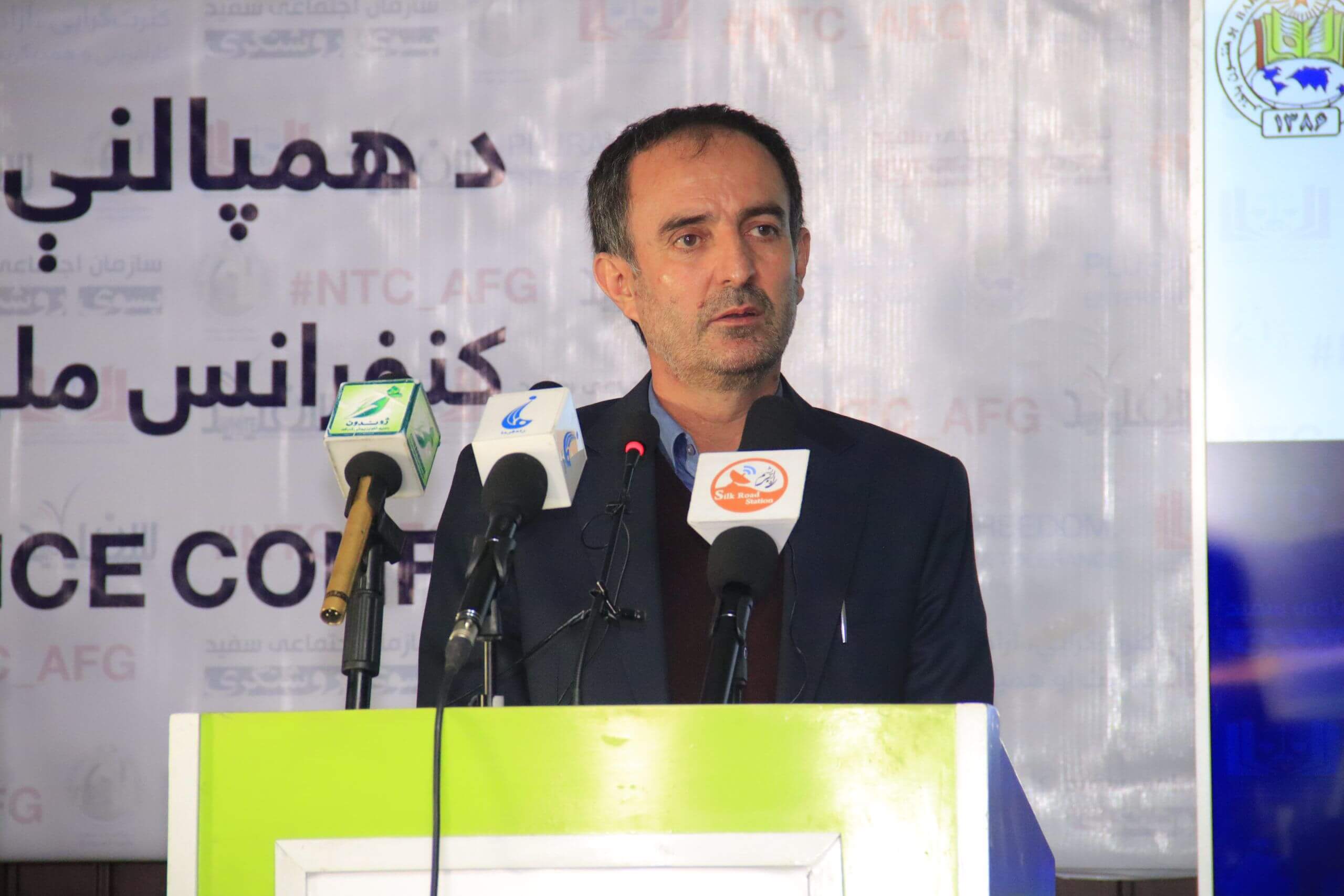
Prof. Sarwari, director of AELSO Academy and Kabul university professor as another speaker of the conference, stressed out the liberty and its criteria and said: ” Freedom is the foundation of development, prosperity, progress and excellence of human societies. According to most philosophers, having liberty is impossible without having mutual acceptance and tolerance because if we don’t be free and have freedom of choice, we can’t live in a mutually acceptable and prosperous society. According to most scientists, freedom and liberty has two kinds: 1) Internal freedom, 2) External freedom
In the discussion of internal freedom, humans need to provide a platform for the developing mutual acceptance by purifying their soul and psyche from prejudices, resentment and turbidity. In the discussion of external freedom, freedom is considered by the governing institutions of society for the better adaptation of individuals in society to with the system of government.”
By continuing his speech, Professor Sawari added: ” Philosophers and thinkers define mutual acceptance as a creation of dialogue between human beings. In order to have a developed country, we need to open the connection and dialogue between our people, so they could accept and adapt different ideas of each other because according to extensive researches, the main source of the enormous wars of the world is the lack of knowledge of the parties from each other and the lack of dialogue and debate.”
Another speaker of the National Tolerance Conference, Saighani, religious scholar and Head of the Iqra Research Centre, spoke about mutual acceptance and tolerance from perspective of the holy religion of Islam and said:” By referring to the teachings of the holy religion of Islam, we can find that the holy religion of Islam is for everyone from every corner of the world as well as Prophet Muhammad (PBUH) was the one who worked for human being and tolerance among the people. Therefore, the holy religion of Islam is the school of mutual acceptance, tolerance and liberty. The wise human is the human of understanding, so that human goes to rationality with the right discernment of falsehood, and the professors of the universities, the religious scholars, the academic institutions are the meant to accelerate and speed this process.”
He also added:” Religious scholars have the mission to take serious and practical steps in the country in order to promote values of mutual acceptance, tolerance, liberty, pluralism and prosperity which are in accordance with the rules of the holy religion of Islam and are all listed in the book of “Islamic Foundations of a Free Society “.
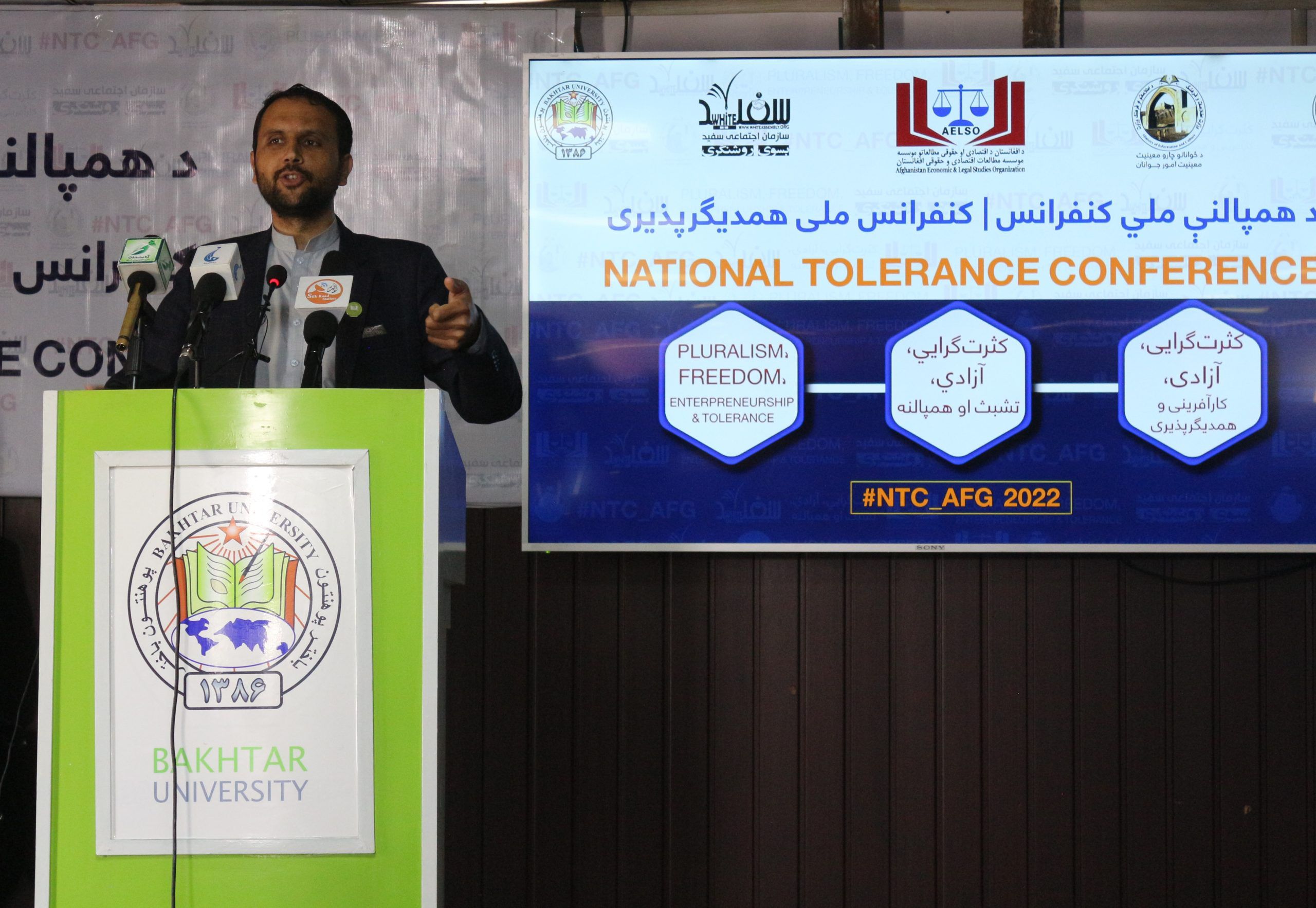
As last speaker of first part of the conference, Hemat Khawani, Head of Journalism Faculty of Bakhtar University, pointed the role of media and journalists for promoting the values of mutual acceptance and tolerance and said:” Tolerance is an important moral factor of a community. If we want to have a developed country we need to have a tolerant society, accept each other, listen, argue and respect to the opinions of each other. In the part of promoting these values by the media in our country, the media departments should consider following points:
1) National Pride and Dignity: The media can play a major role in promoting the values of co-existence while broadcasting news related to national issues, such as pride in the sports, education and competition sections of the entire Afghan nation.
2) Creating optimism for the future for the people: The media can create optimism for the people by focusing on the positive parts of society, such as ending the war, mining, reflecting the developments and important achievements of the country, and promoting mutual values in society.
3) In a state of crisis: In a state of crisis such as; natural disasters, to reflect the common sense that exists among all citizens of the country to help each other, media can play a major role in using this opportunity to spread culture of tolerance among members of society in the country.”
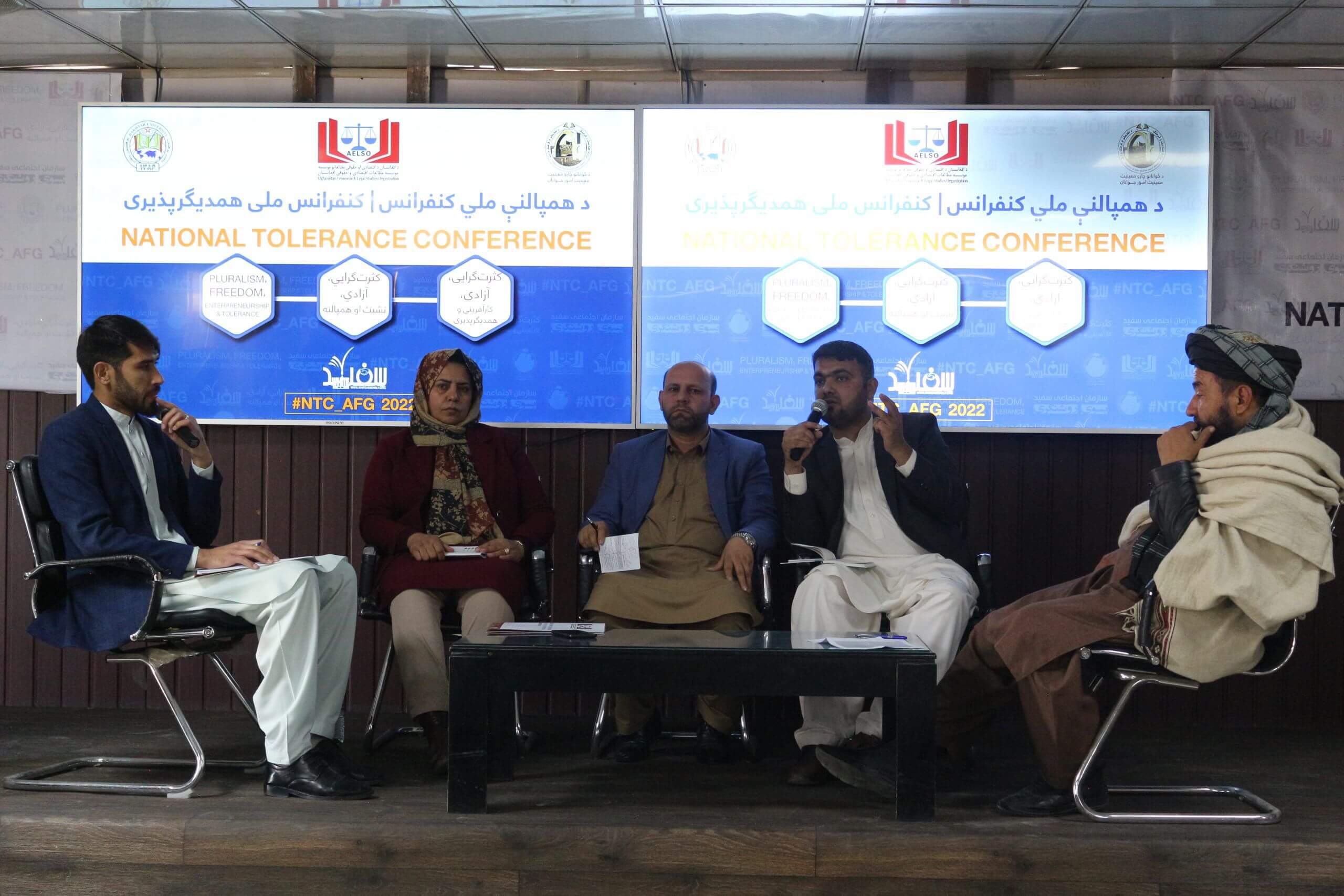
In exclusive panel of the National Tolerance Conference with the participation of Humaira Haqmal, university lecturer and Head of Law & Political science faculty at Bakhtar University, Abdul Aazem Mohmand, Professor at Kabul University, Mr. Saighani, religious scholar, Hazratullah Sharifi, Head of programs coordination at Deputy Ministry for Youth Affairs and Mr. Beheshti, Head of research department at Afghanistan Economic & Legal Studies Organization(AELSO), discussed the values of mutual acceptance, tolerance, liberty, pluralism, freedom and prosperity as well as the future opportunities and outlooks of these values in Afghanistan.
Pointing the role of universities and academic institutions in promoting mentioned values, Professor Mohmand briefed his speeches into two following points and said:
1) Youths of the society have the right to be benefited the opportunities of education which provides by the government of the country. Fortunately, during the last 20 years, most investments of the country was focused on the growth of the country’s academic layer, and as one of the major achievement of the last 20 years, the level of literacy among the community, especially the country’s youth has increased.
2) Educating members of society as tolerant and mutually acceptable personalities is another mission entrusted to academic institutions in a country. Youth characterization begins with these academic institutions. Therefore, it is necessary to make every effort to accept the dimensions of humanitarianism and promote a sense of mutual acceptance among people in order to reduce intellectual conflicts and increase respect for the opinions and views of everyone.”
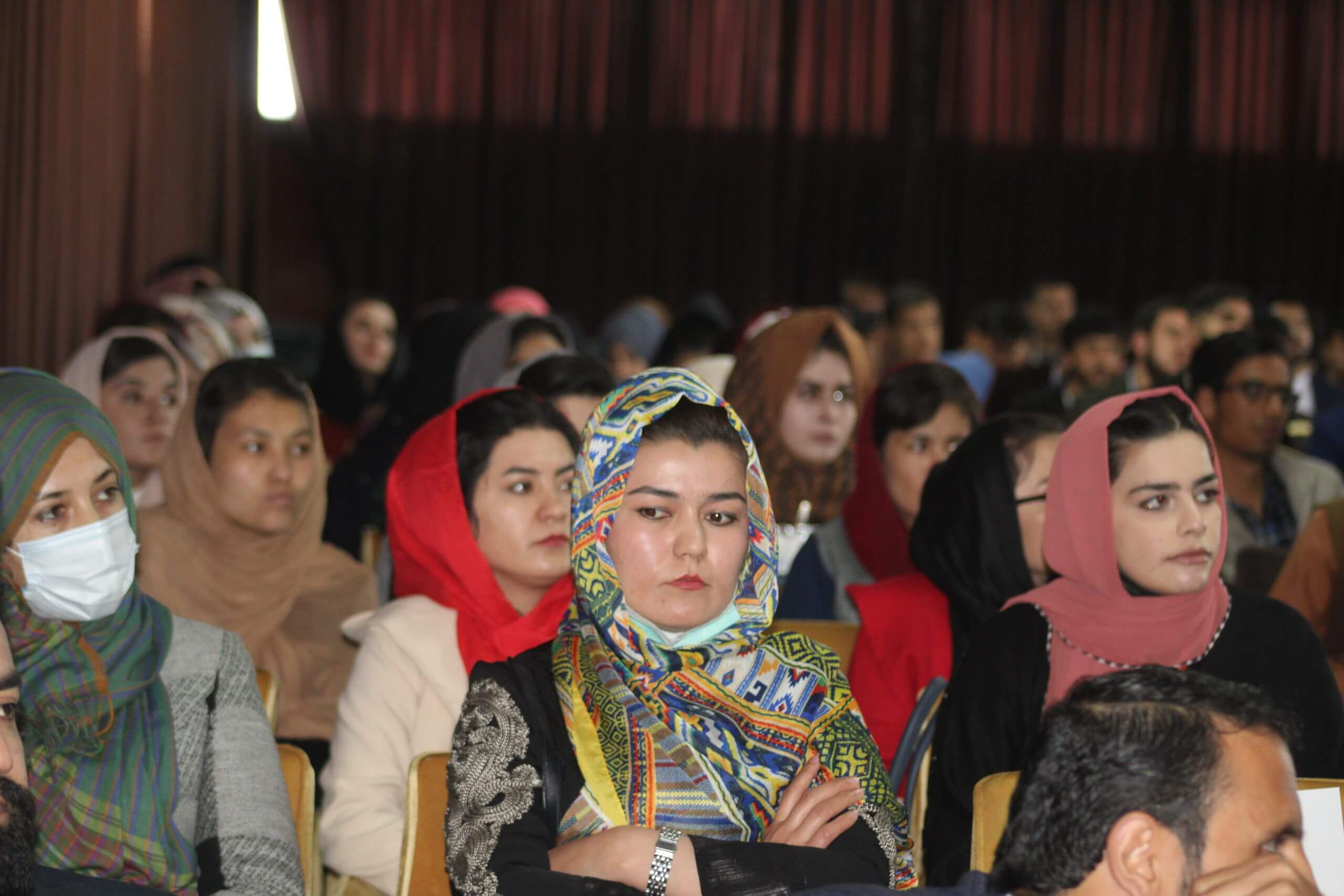
Speaking about political theories for mutual acceptance and tolerance, Professor Haqmal said: “For the first time, the issue of tolerance was raised by the political school of liberalism, which proposed absolute freedom for human beings because they believed that human beings have logic and wisdom to do actions which would not harm other human beings, but later due to the repeated actions of human beings in the discussion of the misuse of freedom, different types of thoughts and ideas were raised against liberalism by using this vacuum, which led liberals to change the definition of freedom and emphasize that freedom is to do anything as long as the freedom of others is not harmed.”
Prof. Haqmal also added: “Tolerance means flexibility and acceptance because the mutual acceptance dictates that you should accept the words of the other side in the discussion. She also stressed that:” Our country can only go to the pave of pluralism when we make a fundamental investment in education and training, teach mutual acceptance at the school and university to the youth and citizens of this land.”
Speaking on behalf of the Deputy Ministry for Youth Affairs at the panel, Hazrat Sharifi said: The Deputy Ministry for Youth Affairs works in different aspects for youths such as; clarifying the mentality of the youth, providing jobs and employment opportunities for the youth, enhancing systematic capacities and increasing culture of tolerance among the youths. We seek to fight against extremism by having connections with major think tanks such as the Afghanistan Economic &Legal Studies Organization (AELSO), country’s universities and academic institutions in order to work hard in eradicating this phenomenon in the society.”
Mr. Saighani, explained tolerance and liberty from the perspective of holy religion of Islam and said:” From the perspective of Islam religion, mutual acceptance and tolerance has a very important role due to many resources and holy Quran verses mentioned and guided Muslims to observe these values. Also, due to long-lasting war our country faced politicization in which religious scholars have a duty to rectify the situation and I think there are a few issues that need more attention in our society:
1) Economy: Working towards improving, expanding and developing the country’s economy in order to become self-sufficient and increase the country’s domestic trade, is the basic need of our country
2) Emphasizing the sense of love and friendship between family members because family is the Center of mutual acceptance
3) Promoting the culture of reading in the country
4) Paying the necessary attention to the higher education of Afghan girls and boys in order to have a knowledgeable and mutually acceptable generation.
Also in the second part of the panel, the panelists listened to the views and opinions of the participants and answered their questions.
A number of views on the importance and necessity of conducting National Tolerance Conference in the current situation of Afghanistan from the participants have been formulated as follows:
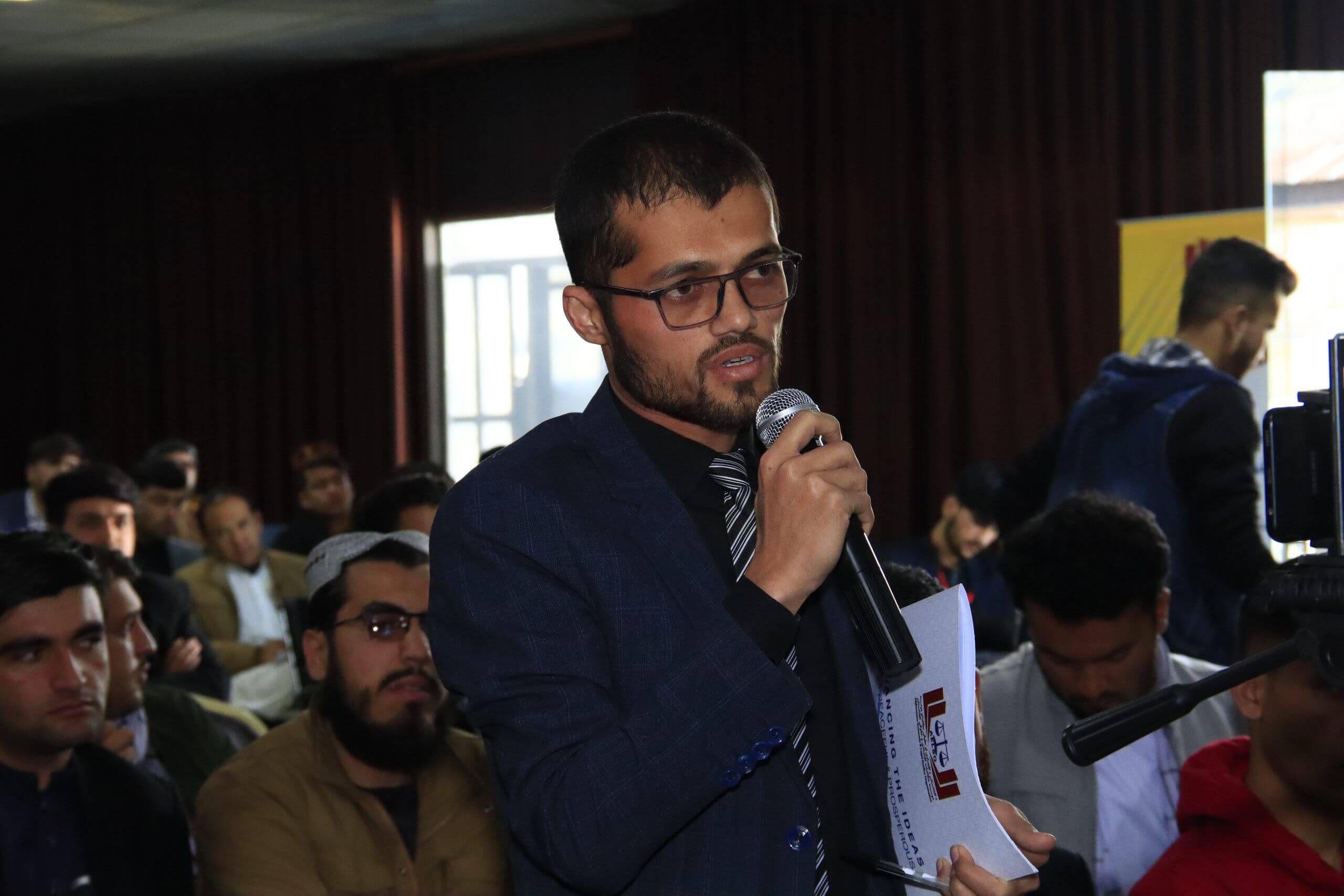
Hazharul Haq Shamsi, participant from Parwan province: “Conducting a national conference on tolerance in the current situation is very importance because with the gathering of youths from all over the country, the opportunity to get acquainted with different cultures, thoughts and ideas between each other. As representative of Parwan province I will share the experiences and what I learned from this useful and scientific conference for the youth of Parwan province and especially the students of the educational institutions of my province, accurately and correctly. I am very happy for participating in such a conference after a long break due to the last political changes in the country. I sincerely thank the organizers and supporters of this program for carrying out such practical activities for a prosperous Afghanistan.”
Tamana Sadat, participant from Kabul province: “In such a situation where the country is facing many challenges and crisis, organizing such conferences is considered as the first step to re-motivate youths to work and strive for the development of the country. As youth of the country, I preferred to stay in my country rather to escape and decided to continue my activities by participating in this scientific conference and to work to reform the society and promote the values of tolerance, pluralism and liberty in the community, especially in my province.”
Mohammad Fahim Mayar, participants from Kabul province: “Organizing such conferences can create a safe platform for youths to exchange ideas and become aware of each other’s ideas, opinions and thoughts. It can also create a discourse among youths on issues of tolerance, pluralism and liberty. This program will pave the way for building strong communication and network between youths across the country so that everyone can work side by side to have a developed and prosperous Afghanistan.”
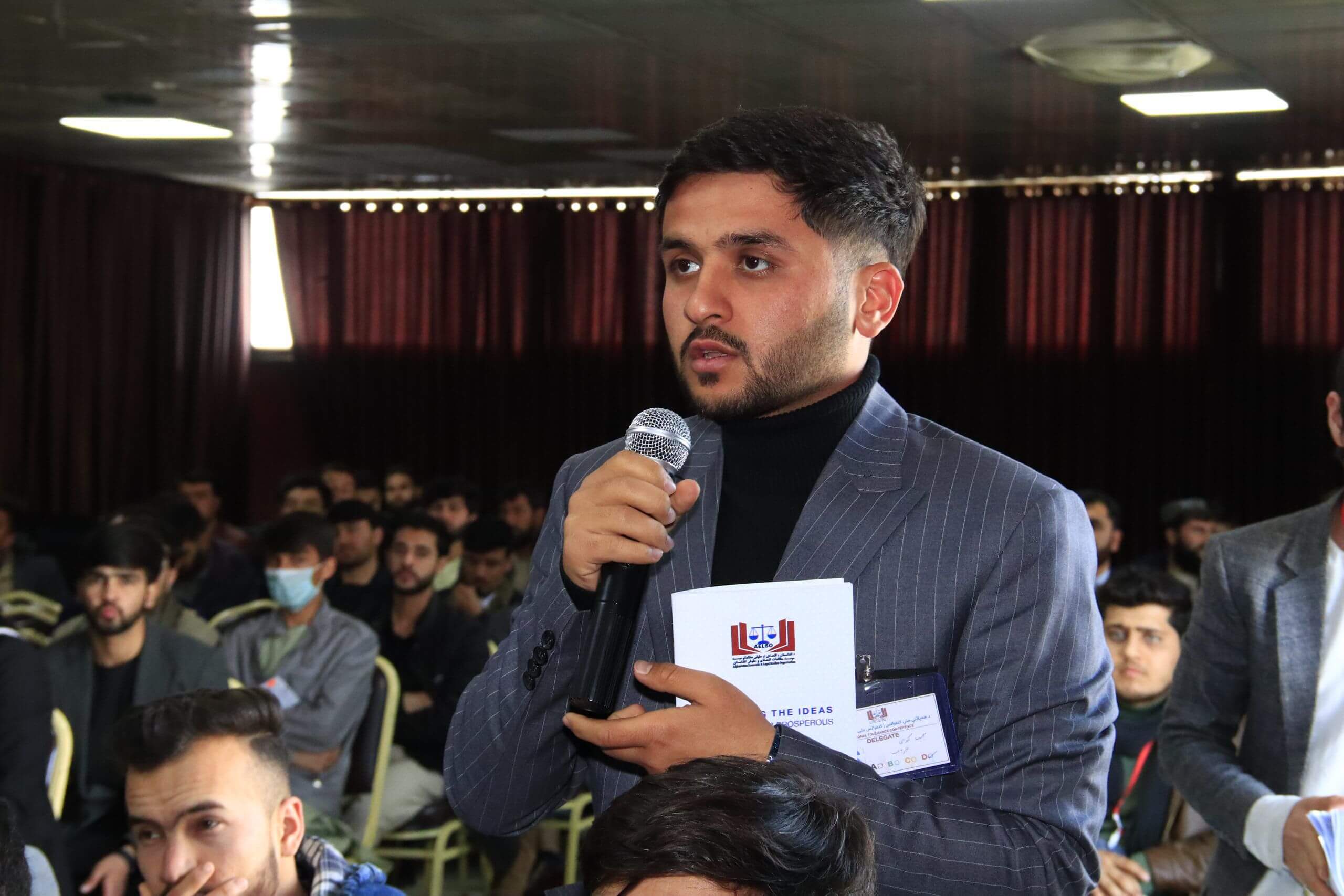
Besmullah Moradi, participant from Sar-e-Pul province: “Encouraging different races, tribes and religions to live peacefully and away from prejudice is the basis of mutual acceptance and tolerance. There are many narrations about these mentioned values from different perspectives of religions and I briefly say: all the religions prohibited war and violence, from the Buddhism to Zoroastrianism, Christianity, Judaism and Islam, all the religions agree on nonviolence. The holy Quran says; killing one individual is like killing all Muslims. Therefore, for having a prosperous country and promoting co-existence among our country’s people, we need to obey our religion commands and instructions.”
Hassan Husienyar, participant from Ghzani province: “Despite the fact that the demonstrations coincided with the location of the National Tolerance Conference which has closed the roads, this conference was conducted very well. From the beginning to the end of the conference, I closely monitored the mood, movements and behavior of the participants. I must admit I was amazed. Society has strangely and mysteriously taken on the spirit of motivating and organizing its citizens with its own magical forces. Some vibes can never be stopped, such as the vibe of consciousness. I strongly believe that good days are coming soon.”
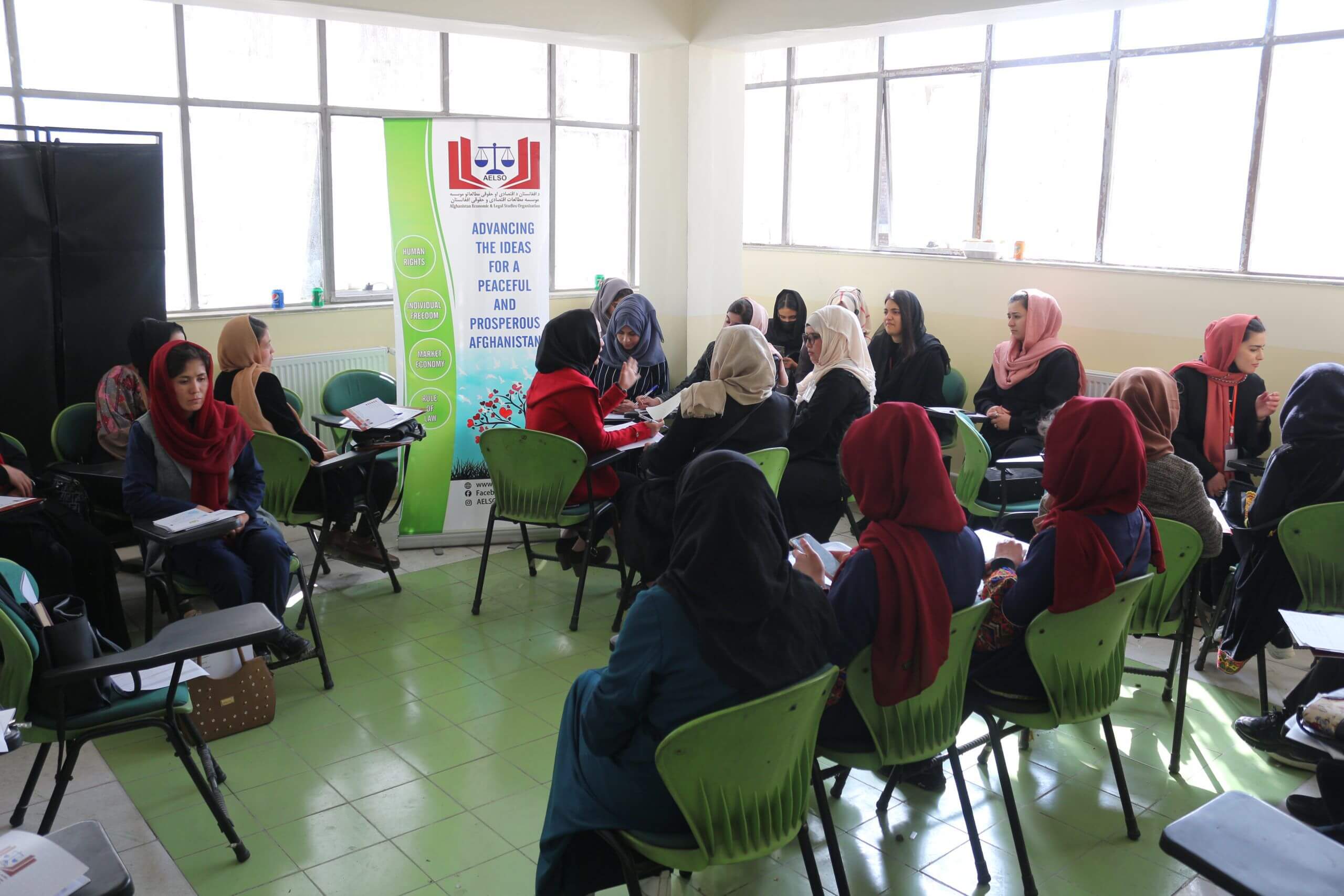
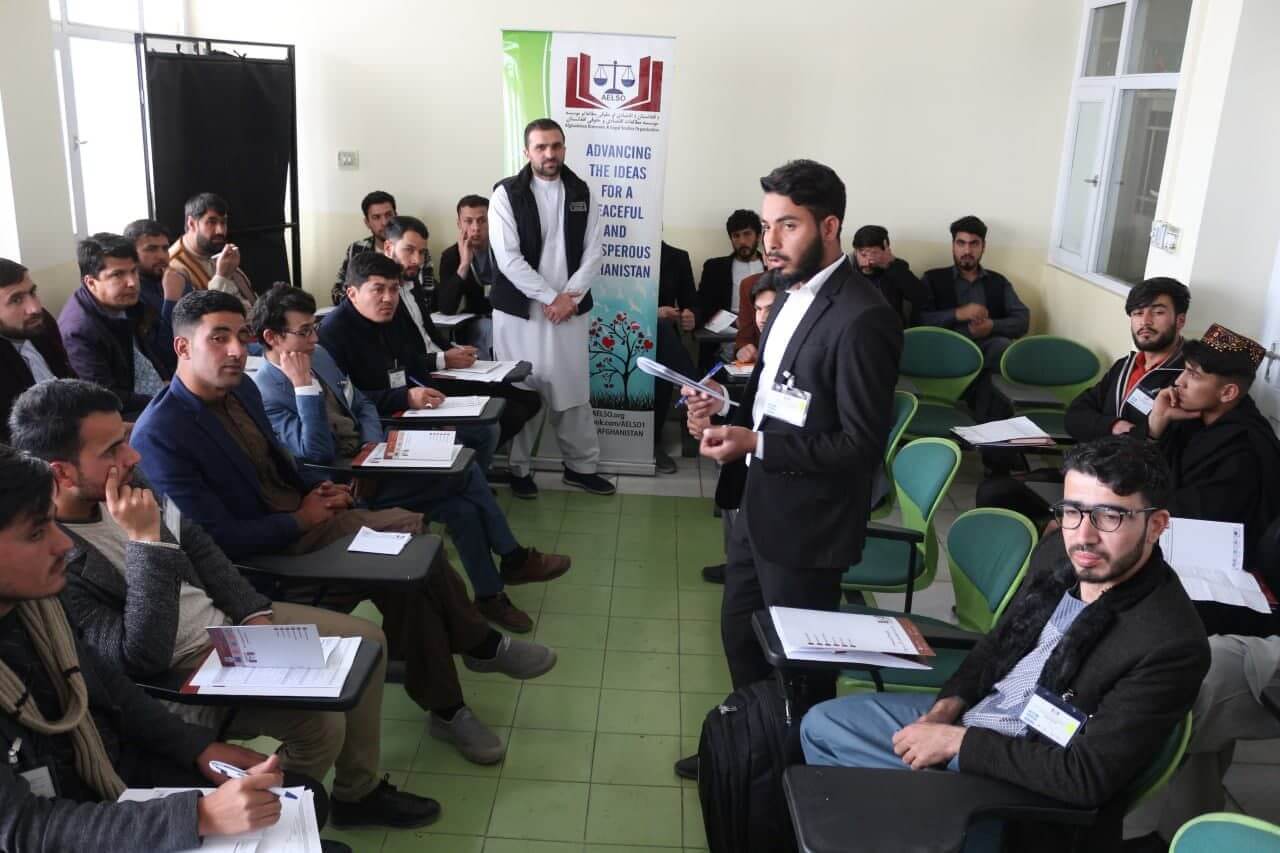
In the part of group working; Participants of the National Tolerance Conference discussed on four main topics, including: The ways and strategies to promote tolerance and mutual acceptance, the role of pluralism in the transition from political and social conflicts at Afghanistan, thought and ideas of youths about development, economic growth and prosperity in the country and the relationship between liberty and Islam.
At the end of group working, one person as representatives of each group shared the results of their discussions with the participants:
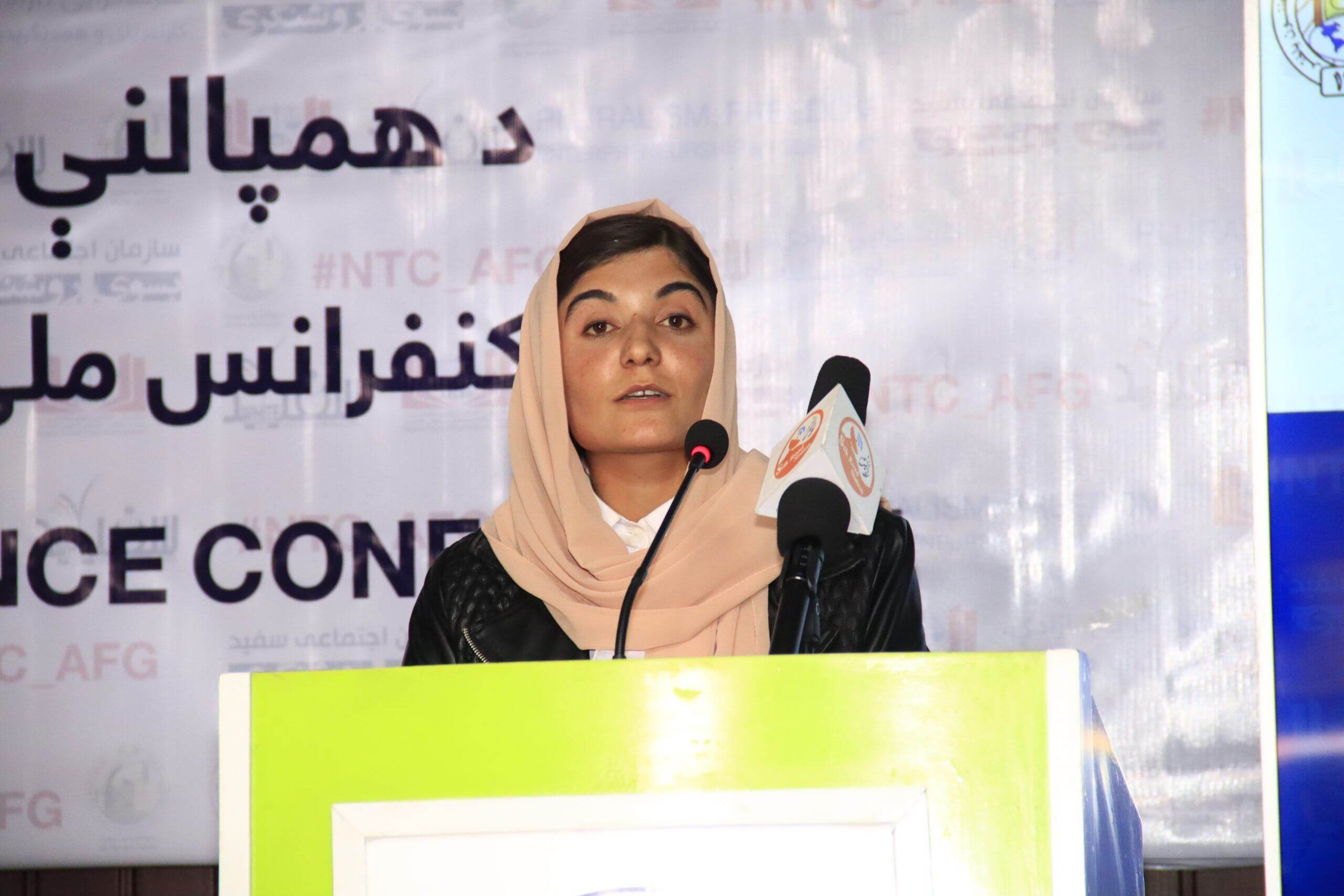
Suwaiba Abedi, representative of Group (A), presented the results of her group working about the ways and strategies of promoting tolerance at Afghanistan as below:
Tolerance in its simplest definition is the acceptance of different ideas and attitudes at different levels of human societies. The most important strategies to promote co-existence has prepared and suggested by our group into two levels:
1) Micro level (individual)
2) Large level (community and government)
At the micro level, the strategies that institutionalize mutual acceptance in our society are:
1) Changing attitudes and correcting individual beliefs to accept differences, fundamentally
2) Promoting a culture of tolerance and mutual acceptance through important different parts of the society such as: family, schools, and universities
3) Having direct cooperation’s with media for promoting mutual acceptance, tolerance and co-existence values
4) Enhancing understanding level of individuals through conducting such a conferences and facilitating organizing such programs in different provinces of the country
On a large level, the most basic solutions are:
1) Elimination of citizenship gaps with the establishing social justice system
2) Reflecting political pluralism by sharing all political spectrum in the power and important decisions of the country
3) Developing a medium-term policy for trade development and deep social and scientific-cultural connections between the provinces
4) Promoting and creating institutions with real national goals and programs in the social and political fields
5) Non-segregation of gender, language and position in the fundamental rights of citizenship
6) Raising social and political awareness for promoting values of mutual acceptance, tolerance, pluralism, liberty and prosperity in every corner of the country
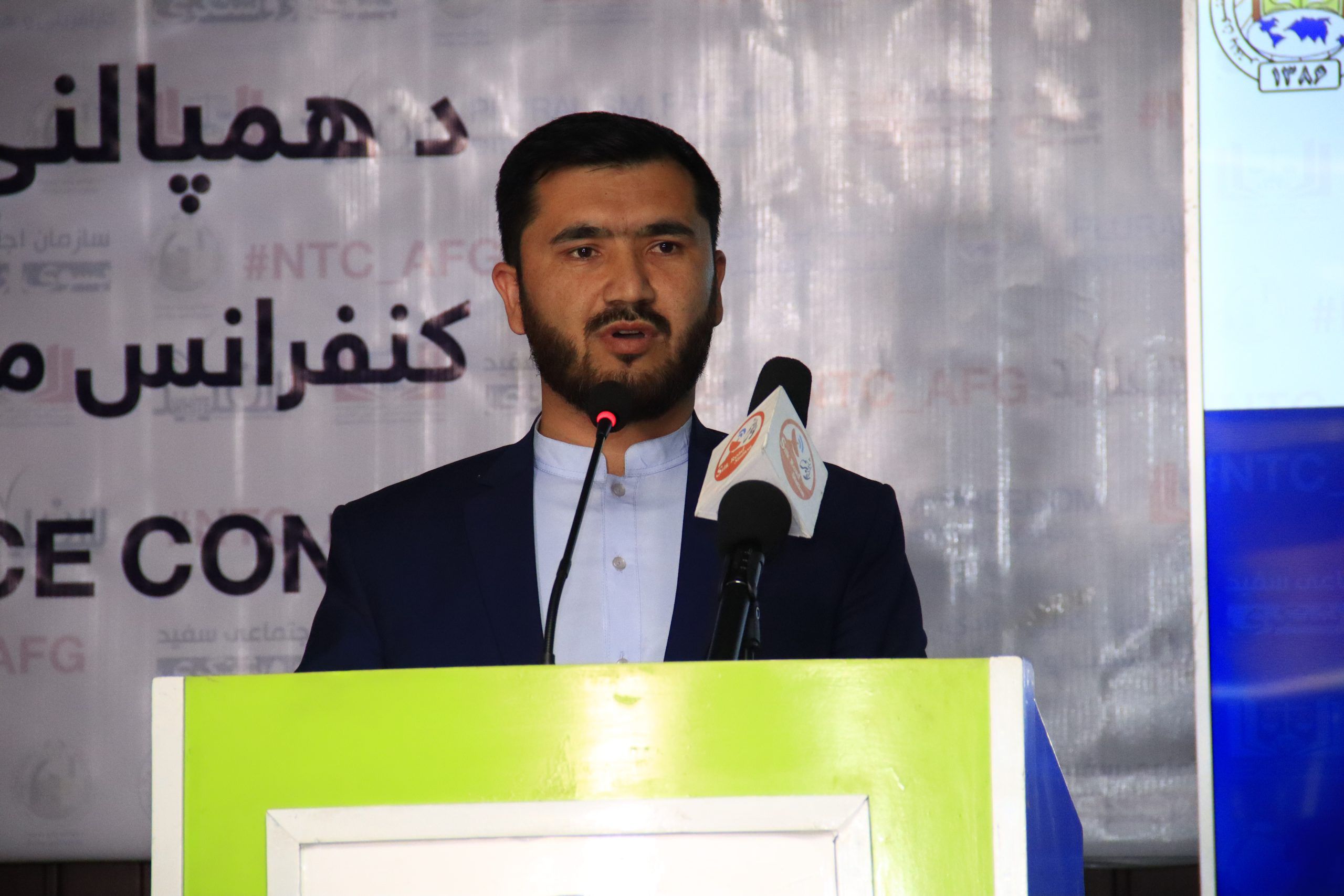
Ziauddin Jahish, representative of Group (B), expressed the results of his group working on the role of pluralism in the transition from political and social conflicts in Afghanistan:
Pluralism is the recognition of the diversity of ideas, perspectives, cultures and traditions that oppose exclusivism. Fortunately, we in Afghanistan, as Muslims and Afghans, have various resources and credible guidance about pluralism.
According to his group discussions, pluralism can be summarized in five following parts: Political, religious, moral, cultural and social
1) Political pluralism: A nationalist system and thought should be established and promoted among all layers of the community. This process contributes the participation of all races in governance and the equal distribution of power, opportunity, wealth and possibilities among all races and tribes. The system of government must be decentralized because the centralized system of power has caused many crises in the country in all periods of history and is ultimately one of the causes of collapse of the republic and democratic regime in last months at the country. Plus, meritocracy should not consider as victim of pluralism but we should use pluralism as the basic solution of our country’s problem.
2) Religious pluralism: Promoting religious enlightenment and intellectualism among all people of the society using various methods, especially in mosques and from the family level to the university.
3) Moral pluralism: Not ignoring and underestimating the habits, customs and traditions of different ethnic groups living in the country and respecting them. Despite the struggle against fighting against prejudice, this phenomenon has promoted in different areas of the country, therefore, to have a pluralistic society, prejudice should be introduced as an ugly moral phenomenon in society.
4) Cultural pluralism: Promoting cultural and traditional activities and respecting the culture of all ethnic groups so that this process can be implemented as a scientific solution in all areas and provinces of the country. In this factor, we can use technology, media and sports as tools of co-existence and pluralism.
5) Social pluralism: Self-construction, self-knowledge and self-improvement, which transmits all the challenges of the individual in society. In our opinion, the reform of the individual will lead to the reform of society, country and system. Creating understanding between elites and people on presenting scientific definition of problems will lead the country to have an exact framework and definition or political system.
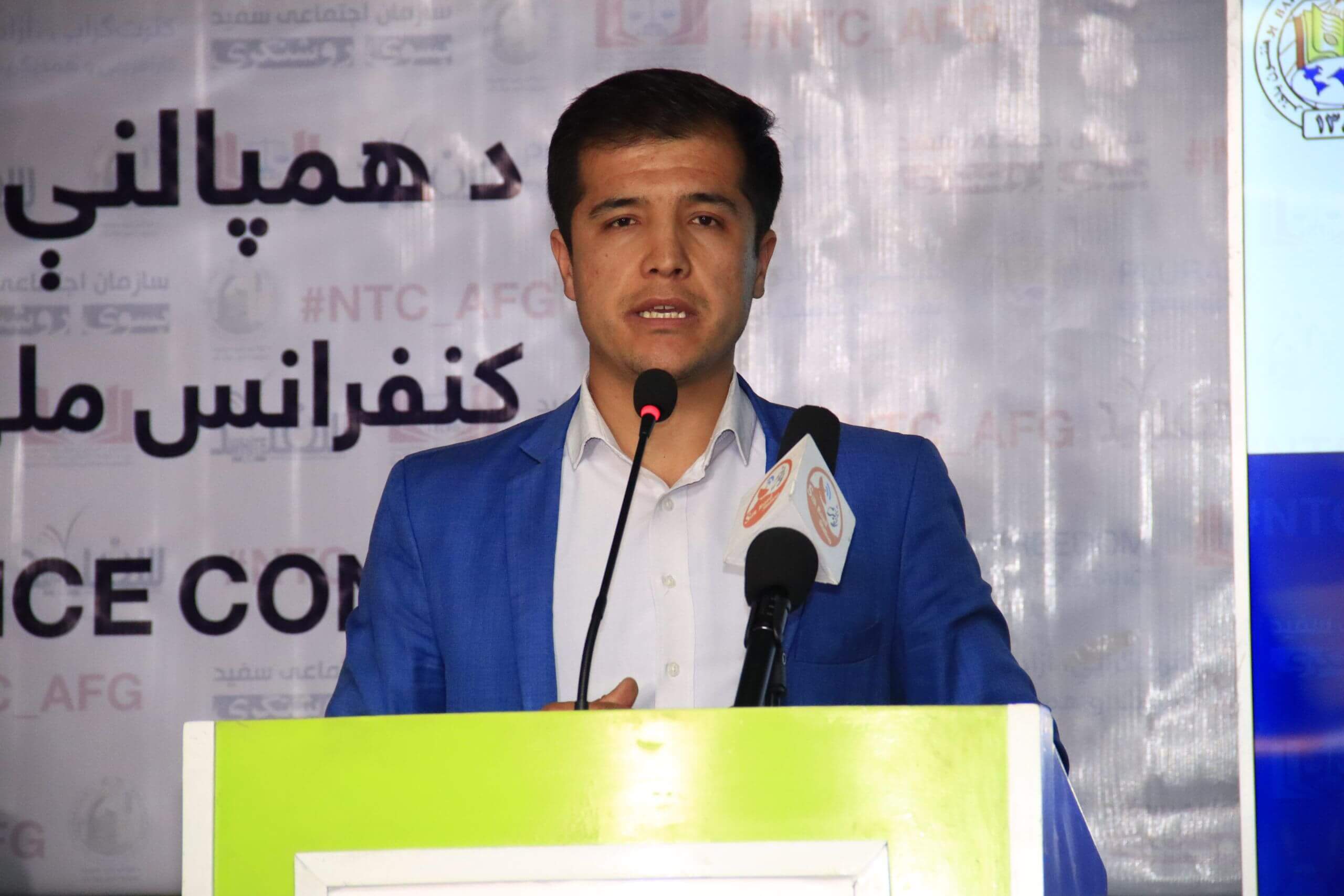
Gulam Hazart Nikpa, representative of Group (C), summarized the ideas of youths development, growth and prosperity of Afghanistan in following tips:
According to this group, observing following points will lead the country to economic growth and independence:
- Having an economic system in accordance with the conditions, culture, beliefs, capacities and economic resources of the country which is no other system than a free market based system
- More use of machinery and mechanization of agriculture
- Moving towards industrialization and creating production factories
- Supporting emerging industrialists and entrepreneurs
- Having appropriate fiscal and monetary policies
- Fair taxation and prevention of tax evasion
- Use of natural resources and mining of the country
- Establishing factories in the provinces according to the existing capacity of targeted province. For example, in Kandahar province there are many pomegranates, so we can establish pomegranate juice factory and like this in other provinces we can establish using their internal capacities
- Encouraging and supporting youths in the field of economic investments
- Establishing an inclusive government to provide job and economic opportunities for all people of the country
- Providing security because without security economic stability and prosperity is impossible
- Supporting domestic quality products
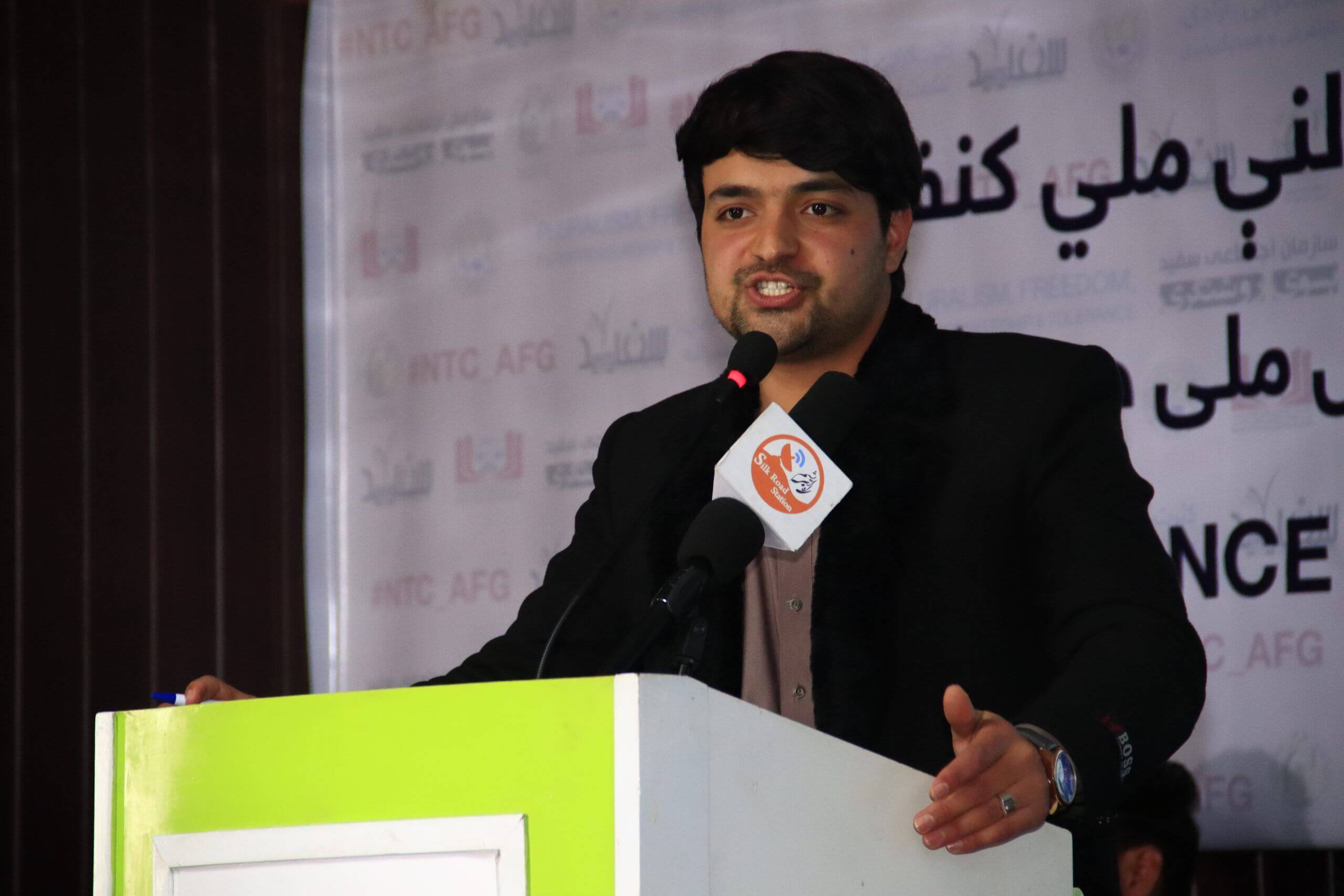
Mohammad Aewaz Danial, representative of Group (D), Expressed the results of exchanging views in their group on the relationship between liberty and prosperity as well as promoting these values in accordance with the teachings of the holy religion of Islam as follows:
Liberty & freedom is work and performance with obligation. Prosperity is having the prosperous life elements. Freedom and prosperity is two basic elements of human life that without having these characteristics living is impossible.
For freedom and prosperity, holy religion of Islam determined specific role and economic system according to the need and demand of the community and encouraged governments to bring prosperity for its people.
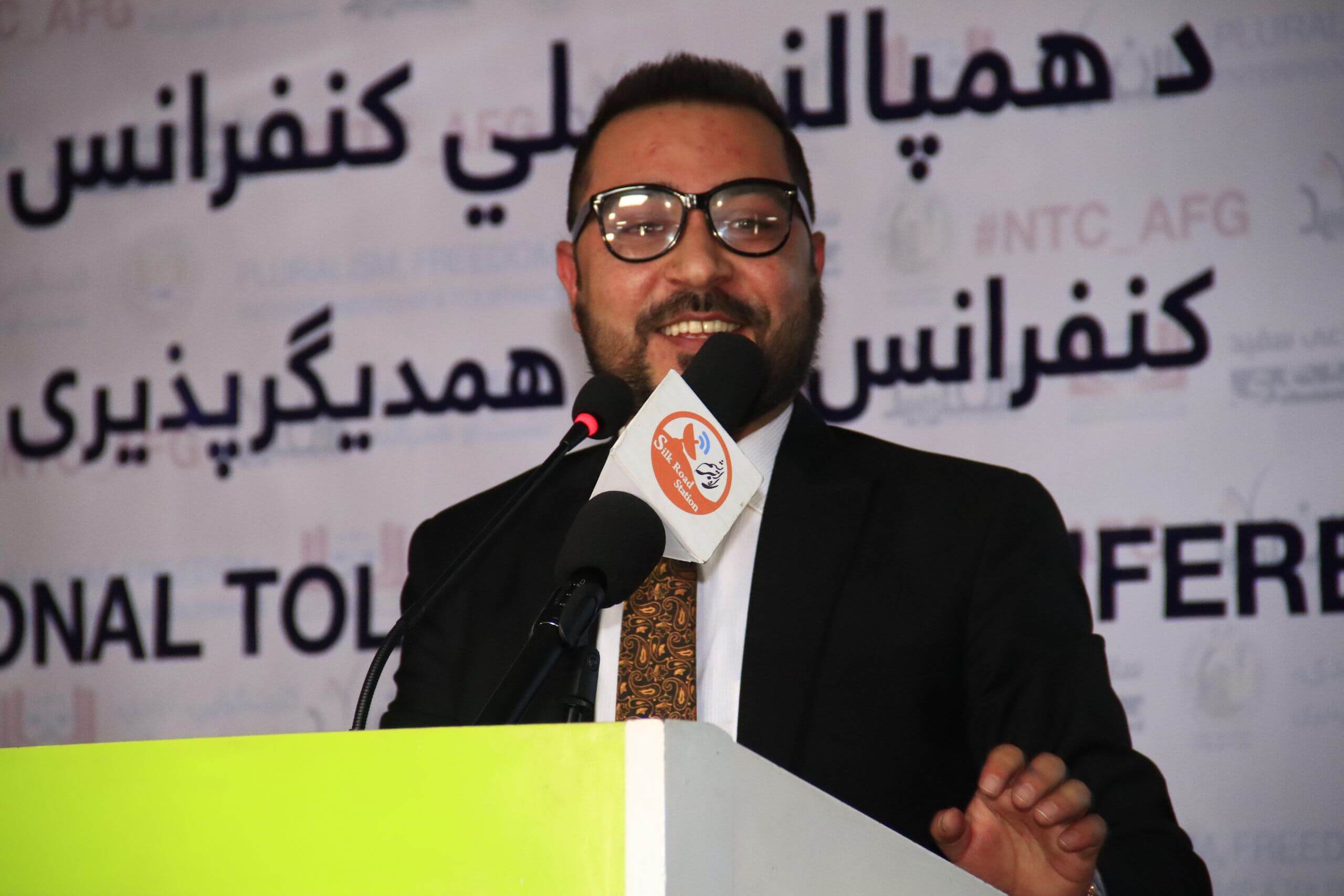
Hanif Farzan, lecturer of Bakhtar University and member of The White Assembly leadership board, summarized the National Tolerance Conference and expressed the results and expectations of participants in following points:
The prosperity, happiness, growth and development of a society depends in tolerance and mutual acceptance and we, as active members of the society, have the responsibility to reform it. In order to promote the values of mutual acceptance, tolerance, co-existence, pluralism, liberty and prosperity at our country, we need to consider following tips:
1) Cultural and linguistic diversity
2) Highlight the role of scientific and academic institutions in promoting and institutionalizing the values of mutual acceptance and pluralism in Afghanistan
3) The role of the education system for promoting the mentioned values through adding tolerance and pluralism as learning subjects in studies curriculum of the country
4) Producing useful programs by the media in this field
5) Considering gender and equal participation of women across the country
6) Establishing a national form of government by involving all citizens in the national sovereignty of Afghanistan
7) Raising the culture of using social media platforms properly
Suggestions for youths and participants of the National Tolerance Conference:
1) Participants of this conference as the representative of their respective provinces, have the responsibility to convey what they have leaned to the youths of their provinces by organizing such useful and scientific programs
2)Take active part in promoting values of mutual acceptance, tolerance, liberty, pluralism and prosperity in their community
3) Youths have the mission to be the role model of tolerance for future generations by putting sacrifice, effort and hard work
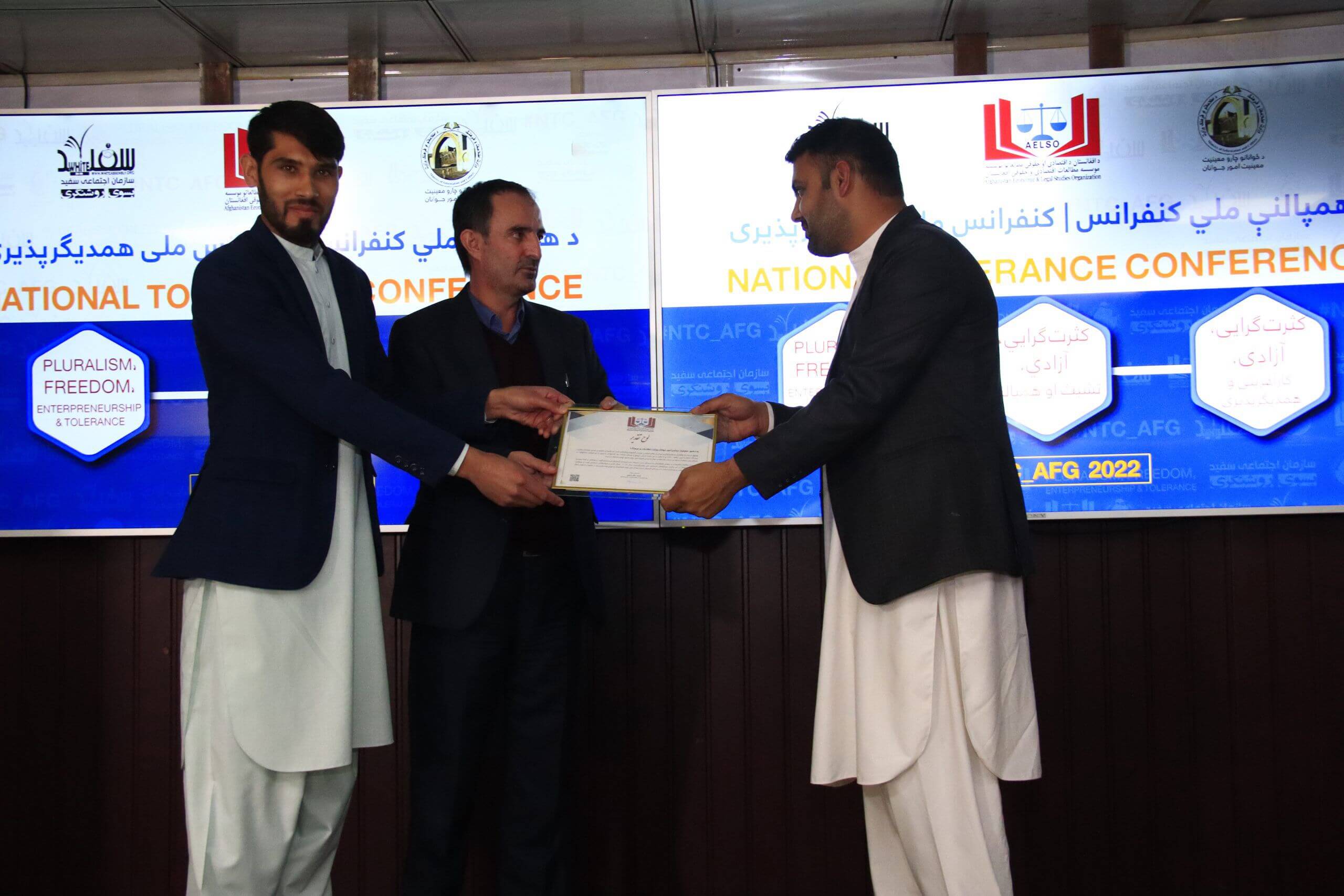
The National Tolerance Conference ended by dedicating appreciation award to Bakhtar University and other partners of the conference for their committed and valuable contributions in conducting the National Tolerance Conference by the Afghanistan Economic & Legal Studies Organization (AELSO), distributing the certificates and book of Islamic Foundations of A Free Society and other publications of AELSO’s for the participants and ended by closing remarks of Mr. Saighani and Mrs. Sonita Sadat with the wish for having a prosperous and developed Afghanistan.
You can watch the special reports of Ariana News in here and 1TV in here.
Publications & Public Relations Department
